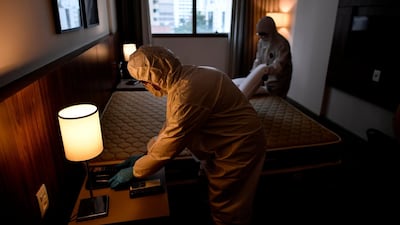The virtual lockdown amid the coronavirus outbreak of Europe has one glaring hole in the curtain. Sweden has taken perhaps the softest approach on the continent.
Despite over 400 deaths, Sweden has adopted a moderate approach that allows many aspects of life to continue.
Children up to 16 still go to school, restaurants remain open and people are legally allowed to roam with freedom while the government has urged people to be cautious and told older people to shelter inside.
Even so, the new realities means sharp adjustments for many Swedes.
Pernilla Nilheim, a 51-year-old resident of central Stockholm who lives with her two teenage children.
The importer of specialist Italian goods has seen her trade evaporate.
“Now it has brutally stopped,” she says. While restaurants remain open, business has plummeted as most people resorts to takeaways or cook at home. The wholesale demand for products such as hers have disappeared overnight.
Only in mid-March did she notice a sudden change in Sweden and for her business and she traces that back to the impact of the wave of deaths sweeping through Italy at the time.
“In a day [demand] just died. I think it was when we realised that what happened in Italy has got to us in Sweden as well," she said. "Especially for me working so close to Italians, it really got to me. I realised the Swedes too stopped joking about it, they stopped saying that it was exaggerated and that they actually switched so quickly.”
She has since found new work supporting vulnerable people who need medication.
“Now I have switched paths you could say because I feel with the situation one has to think really quickly and adjust to survive economically. We all have to go on.”
Ms Nilheim says her boss at the pharmaceutical provider has assured her its activities “will not lock down, it will not close. As long as the hospitals are open, this place will be open”.
Sweden’s response has attracted controversy and there are signs the government may add new restrictions to match neighbours that closed their borders and imposed strict measures.
Ms Nilheim, whose 13-year-old son still goes to school, says “it’s too early for us to know” if Stockholm's approach works. She adds that she “trusts” the health authorities management of the pandemic.
She does, however, also concede there are slivers of doubt. “It’s a little bit scary the approach we have in leaving schools open,”she told The National.
“In Sweden we feel free, we can get out and take walks, we can go out for a run in the forest. We have the social distance, we don’t get close to each other but its still an open society. I think that’s good.”
The important thing, Ms Nilheim says, is that while there are few restrictions by law, people in Stockholm are still listening to the strict advice.

















